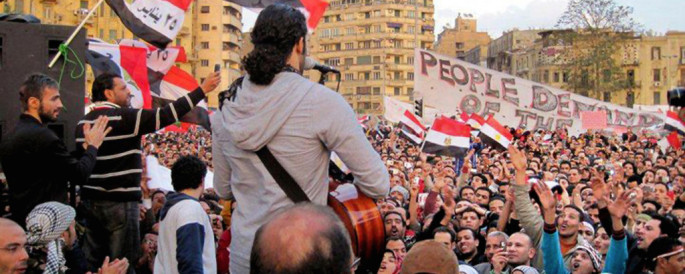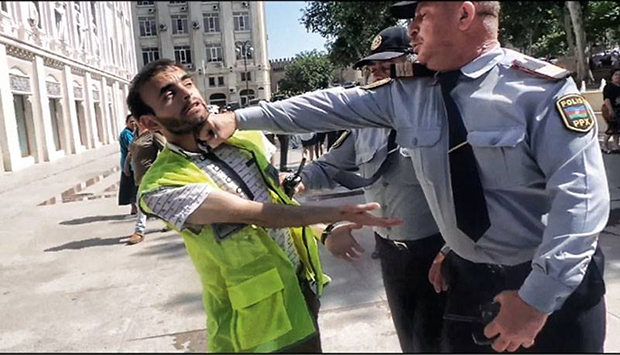13 Aug 2015 | Azerbaijan, Azerbaijan Statements, Campaigns, mobile, Statements
Index on Censorship strongly condemns the sentencing of Leyla and Arif Yunus to 8.5 and 7 years in prison, respectively. The ongoing and capricious judicial harassment of Azerbaijan’s civil society by the government of President Ilham Aliyev has reached a new low.
Leyla Yunus, founder and director of the Institute for Peace and Democracy, and her husband, historian Arif Yunus, have been detained since summer 2014 when they were arrested on charges of treason and fraud.
Index calls on the international community to take concrete actions to pressure the government of Azerbaijan to respect freedom of expression and release all journalists and human rights activists in prison.
[smartslider2 slider=”35″]
[timeline src=”https://docs.google.com/spreadsheets/d/1_rMZeC8deu7lQgoJPEESF0IqNO9u7aVuESqWMualEJw/pubhtml” width=”620″ height=”600″ font=”Bevan-PotanoSans” maptype=”toner” lang=”en” ]
12 Aug 2015 | Events, mobile

Photo – Ramy Essam, Tahrir Square – Festival 800
Join us in Lincoln for Festival 800, a celebration of the 800th anniversary of the sealing of the Magna Carta – a unique and powerful statement that began the world’s march to freedom and liberty.
Index on Censorship are delighted to be supporting Festival 800 and Freemuse who are staging a special day focused on musicians who have been banned from performing their work in their own countries. Events include:
13:30 – Listen to the Banned
Listen to the Banned is a compilation album that features the music of banned, censored and imprisoned artists from the Middle East, Africa and Asia. Project co-founders, music producer Deeyah Khan and Ole Reitov, executive director of Freemuse discuss the album’s origins and their wider work. Khan is a critically acclaimed composer, award-winning documentary film director and celebrated human rights activist. (£8)
16:00 – Talking With the Banned
Two international musicians who have faced censorship, “exiled bard of the Egyptian revolution” Ramy Essam and Basque artist Fermin Muguruza, join others including Deeyah Khan, editor of Index on Censorship magazine Rachael Jolley, and author and academic Martin Cloonan (chair) for a conversation about censorship. (£5)
19:30 – The Banned – Live and unplugged in concert.
A live gig featuring folk musician Ramy Essam who was catapulted to fame by the events of Tahrir Square; Lavon Volski, an icon of Belarusian rock music and Fermin Muguruza, who sings against the oppression that he feels Spain has over Basque Country. With Attila the Stockbroker as MC. (£10)
When: Saturday 5 September 2015, timings as above.
Where: Lincoln Performing Arts Centre, LN6 7TS (map)
Tickets: Special Index offer for whole day £15, quote INDEX when booking.
11 Aug 2015 | Academic Freedom, Magazine, mobile, Student Reading Lists
Articles from this list explore the topic of how minority groups are both being censored and also evade censorship. Includes Kerry Brown on the censored minorities of China at the time of the 2008 Olympic Games and Akeel Bilgrami on the plight of India’s Muslims after 9/11.
Students and academics can browse the Index magazine archive in thousands of university libraries via Sage Journals.
Minority groups and censorship articles
Minorities and the media by Anthony Smith
Anthony Smith, March 1975; vol. 4, 1: pp. 105-106
A study in the use of media by the Mexican Chicano Movement
Enemies Within by Kerry Brown
Kerry Brown, May 2008; vol. 37, 2: pp. 152-161
Kerry Brown on the censored minorities of China
Speaking in Tongues by Lambros Baltsiotis, Leonidas Embiricos
Lambros Baltsiotis, Leonidas Embiricos, March 2001, vol. 30, 2: pp. 145-151
A deconstruction of minority languages in Greece and a look at the battle to keep these languages alive
Just a Question of Money? By Moussa Awuonda
Moussa Awuonda, April 2003, vol. 32 no. 2 187-191
Kenyan journalist Moussa Awuonda details the report pressing the Swedish government to pay more attention to its minority presses
India’s Muslims Post 9/11 by Akeel Bilgrami
Akeel Bilgrami, November 2006, vol. 35, 4: pp. 15-21
Akeel Bilgrami delivers an explosive narrative on how India’s Muslim minority has responded to the aggressive ideology of the majority Hindus
Silencing the disabled: Only the state may help the disabled; others who try are repressed by Steven Marc Glick
Steven Marc Glick, October 1981, vol. 10, 5: pp. 32-33
Author Steven Marc Glick reports from the former Soviet Union on the plight of disabled individuals and new attempts by some to help them
Down The Welsh Road by George Jones
George Jones, July 2001, vol. 30, 3: pp. 206-211
George Jones on the linguistic rights of the Welsh-speaking minority in Wales
Speaking in Tongues by Ayer Neier
Ayer Neier, March 1996, vol. 25, 2: pp. 139-141
The ex-executive director of Human Rights Watch on the danger of suppressing minority languages worldwide
Daring to speak one’s name: A reflection on gay censorship by Alberto Manguel
Alberto Manguel, January 1995, vol. 24, 1: pp. 14-31
As Russian law relaxes and allows homosexual writers a voice, Alberto Manguel reflects on gay censorship in the country
The landscape for religious freedom in the new Egypt by Shahira Amin
Shahira Amin, June 2013, vol. 42, 2: pp. 102-109
Two years after the revolution in Egypt, Shahira Amin reflects on the minority communities who are still trying to get their voices heard
The reading list for minority groups and censorship can be found on the Sage website
10 Aug 2015 | Azerbaijan, Azerbaijan News, Campaigns, mobile

Photo: IRFS
The Sport for Rights coalition resolutely condemns the brutal murder of Azerbaijani journalist Rasim Aliyev, who died on 9 August in a Baku hospital, after he was severely beaten on 8 August by a group of people. Rasim Aliyev had reported receiving continuous threats and intimidation via social media networks for three weeks leading up to his death.
Azerbaijani authorities have launched an investigation into the attack and detained at least one individual so far. Officials are connecting the attack to a Facebook post from 3 August in which Rasim Aliyev had criticised a football player. The relatives of the football players are alleged to have been responsible for the beating.
However, prior to the Facebook post in question, Rasim Aliyev had already been receiving threatening messages connected to a series of photos he had posted online showing police brutality and social discontent, such as protesters carrying a banner reading “Resign”. Rasim Aliyev reported receiving a threat stating “You will be punished for these photos”. He publicised the threat on 25 July, and filed a complaint with the police, who failed to take action to protect Rasim Aliyev.
Rasim Aliyev was a board member and employee of Azerbaijan’s leading media freedom organisation, the Institute for Reporters’ Freedom and Safety (IRFS), and was elected as the organisation’s chairman in October 2014. Rasim Aliyev had faced many forms of pressure in his work with IRFS, including being beaten by police in a 2013 incident that was captured in a widely circulated photograph.
Notably, the attack against Rasim Aliyev took place exactly one year from the date IRFS was forcibly closed by the Azerbaijani authorities and IRFS founder and chairman Emin Huseynov was forced into hiding to ensure his own safety, on 8 August 2014.
“We are deeply shocked and saddened by the murder of Rasim Aliyev”, said Index on Censorship’s senior advocacy officer Melody Patry. “The attack on Rasim takes place in a deteriorating environment for media professionals and civil society in Azerbaijan. Rasim was an independent journalist who kept working after his employer, IRFS, was sealed shut by the authorities. IRFS existed to provide support to journalists like Rasim, especially at a time when threats, intimidation and violence against journalists are commonplace in the country. We call on the authorities to conduct a full and transparent investigation into the attack and bring the perpetrators to justice”.
Rasim Aliyev’s murder is the latest incident in a vicious cycle of violence against journalists in Azerbaijan. Over the past decade, there have been hundreds of attacks against journalists in the country, including the murder of Monitor magazine editor-in-chief Elmar Huseynov in 2005, and writer and journalist Rafig Tagi in 2011. Both murders remain unsolved, as do nearly all other cases of attacks against journalists. Another journalist, Tolishi Sedo newspaper editor-in-chief Novruzali Mammadov, died in 2009 while serving a 10-year prison sentence on politically motivated charges.
This attack takes place amidst a brutal human rights crackdown in the aftermath of the European Games and in the run-up to November’s parliamentary elections in Azerbaijan. In recent weeks, another Azerbaijani journalist, Berlin-based Meydan TV Director Emin Milli, reported receiving a high-level threat, which was shortly followed by pressure against many of his relatives. Four Meydan TV employees were later prevented from leaving Azerbaijan.
“Further evidence of the on-going efforts of the Azerbaijani authorities to silence all forms of criticism and dissent can be found in the many violations taking place in the cases of human rights defenders Leyla and Arif Yunus and journalist Khadija Ismayilova, who are currently standing trial on politically motivated charges”, said FIDH Honorary President Souhayr Belhassen and OMCT Secretary General Gerald Staberock, whose organisations work together within the framework of the Observatory for the Protection of Human Rights Defenders. The prosecutor has requested staggeringly long prison sentences for the Yunus couple, despite the fact that both have serious and worsening health problems and should be immediately released on humanitarian, if not political grounds.
Sport for Rights calls on the Azerbaijani authorities to conduct a full and transparent investigation into Rasim Aliyev’s murder, and to bring the perpetrators as well as the masterminds behind the crime to justice. The cycle of violence against journalists in Azerbaijan must stop, and those responsible must be prosecuted. Threats against journalists must be taken seriously, and the threatened journalists and their families must be afforded adequate protection. The coalition also calls for the authorities to take concrete steps to improve the broader human rights situation in the country, including the immediate and unconditional release of all jailed journalists and human rights defenders.
Sport for Rights further calls for the international community to maintain its attention on Azerbaijan now that media attention has shifted away from the country following the European Games. As Rasim Aliyev’s murder shows, critical voices are at greater risk now than ever before. The international community must act now to hold Azerbaijan accountable for its human rights obligations and promote much-needed reforms in the country.
Supporting organisations:
Article 19
FIDH (International Federation for Human Rights), within the framework of the Observatory for the Protection of Human Rights Defenders
Front Line Defenders
Helsinki Foundation for Human Rights
Human Rights House Foundation
Index on Censorship
International Media Support
Netherlands Helsinki Committee
PEN American Center
Polish Green Network
World Organisation Against Torture (OMCT), within the framework of the Observatory for the Protection of Human Rights Defenders
[smartslider2 slider=”35″]


